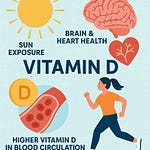Let's talk about protein, the macronutrient that's your muscles' best friend forever (BFF). You'll want those muscles to stick around longer than your high school friendships. As usual please chose between the 15 minute audio version above or the text summary below.
Age-Related Muscle Loss: The Unwanted Weight Loss Program Remember how your parents told you that everything goes downhill after 50? Well, they weren't just being dramatic. After the big 5-0, your muscles start playing a disappearing act worthy of a Vegas magician – about 1% less muscle mass every year. By 75, if you're not pumping iron, you're losing strength faster than a smartphone battery at 1%.
Here's a fun fact that's not actually fun: hip fractures are like nature's cruel joke. They double your mortality risk, with 22-58% of people not making it past a year. (Sorry for the dark turn – let's pivot to solutions before this gets more depressing than a rainy Monday.)
Protein Intake: More Than Your Government Thinks You Need. The RDA says 0.8g/kg of body weight is enough protein. That's like saying one pizza is enough for a teenage boy's sleepover. Spoiler alert: it's not.
Research suggests 1.2-1.6g/kg is more like it. For the math-averse, that's roughly "more than you're probably eating now" grams per day. And if you're lifting weights? Bump that up to 1.6g/kg unless you want your gains to be as disappointing as Game of Thrones' final season.
The "20g Protein Per Meal" Myth: Busted! Remember when everyone said you couldn't absorb more than 20-25g of protein per meal? Well, Dr. Luc van Loon did some research that basically said "Hold my protein shake" and showed that bodies can handle 100g just fine. Your muscles are apparently better at all-you-can-eat buffets than we thought.
Leucine: The VIP of Amino Acids. Think of leucine as the bouncer at Club Muscle Growth – without enough of it (2-3g per meal), protein synthesis isn't getting past the velvet rope. It's like the key that starts your muscle-building engine, and as you age, you need a bigger key. Because getting old is fun like that!
The IGF and mTOR Plot Twist. Some studies suggested high protein might accelerate aging. Plot twist: these risks often disappear faster than your motivation on day 2 of a new diet when you account for other factors like smoking and being a couch potato.
Practical Tips (Because You Actually Want to Use This Information):
Eat more protein than you think you need (1.2-1.6g/kg/day)
Spread it throughout the day like you're distributing Halloween candy – evenly and generously
Consider pre-bed protein (because nothing says "sweet dreams" like a protein shake)
Animal proteins are generally better, but plant proteins work too if you're willing to play the quantity game
Your kidneys can handle high protein unless they're already compromised (they're tougher than they look)
Remember: Getting enough protein is like having insurance for your muscles. Except unlike your car insurance, this actually pays off when you're trying to open that stubborn jar of pickles in your golden years.
And hey, if all this protein talk has you worried about longevity – don't be. The research suggests healthy people eating high protein are likely to live longer.
Finally, all these benefits of sufficient protein intake work only if you exercise. Check out workouts in our app BreathNow which are specifically targeted at improving cardiovascular health (including lowering blood pressure) and protecting your muscles from sarcopenia.













Share this post